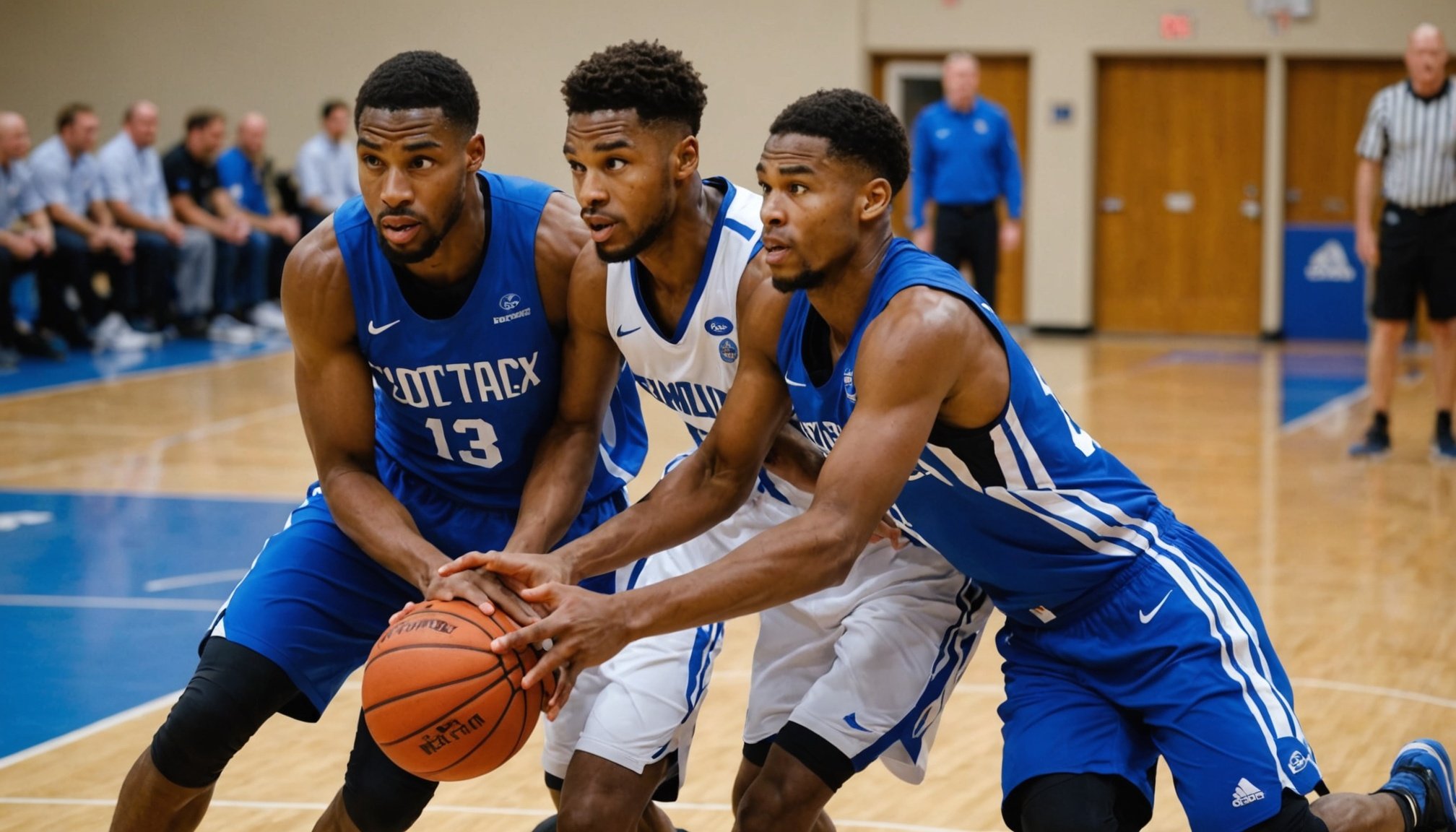Overview of Nutritional Needs for Basketball Centers
Basketball centers face unique physical demands, necessitating tailored nutrition for optimal performance. Their nutritional needs are pivotal in supporting the intensity and endurance required during games. A bespoke nutritional plan can significantly enhance their on-court capabilities, ensuring they meet the physical challenges head-on.
Understanding the balance between macronutrients is crucial for basketball centers. Key macronutrients include carbohydrates for energy, proteins for muscle repair and growth, and fats for sustained fuel. Carbohydrates are particularly essential as they provide the immediate energy necessary for quick bursts and long sprints. Proteins support muscle strength, vital for physical encounters in the paint, while healthy fats offer long-lasting energy.
Topic to read : Top Cutting-Edge Shooting Drills for UK Basketball Coaches to Elevate Player Performance
Players benefit from aligning their diet with their performance goals to maximise game-time endurance. Adequate nutrition ensures not only physical stamina but also mental sharpness, both critical during high-pressure situations. Nutrition directly impacts basketball performance, as it fuels the body before, during, and after games. Ensuring glycogen stores are filled, crucial for endurance, helps in maintaining performance levels throughout the match.
Incorporating these strategies enables centers to withstand the rigors of the sport, enhancing effectiveness and prolonging their athletic careers. Ultimately, understanding and adhering to their nutritional needs lays the groundwork for peak performance and sustained endurance on the court.
Also read : Enhancing Free-Throw Accuracy: Effective Visualization Strategies for UK Basketball Players
Meal Planning for Basketball Centers
Developing a robust meal plan tailored for basketball centers can significantly enhance their performance and recovery. Proper sports nutrition involves understanding the unique demands placed on a player’s body.
Effective Pre-Game Meal Strategies
Getting pre-game meals right is crucial for optimal performance. Timing and composition of meals can make a big difference. A meal consumed about 2-3 hours before a game should include a balanced mix of carbohydrates, proteins, and fats. Carbohydrates are particularly important as they supply the energy needed for intense activities. Pre-game snacks might include a light sandwich or a banana, easily digestible. Nutrient balance ensures sustained energy throughout the game.
Daily Meal Structure
A consistent daily meal planning structure is vital for maintaining energy levels and supporting recovery. Basketball centers should aim for at least three main meals, interspersed with snacks. This frequent eating helps maintain blood sugar levels and prevents energy dips. It’s essential to incorporate a wide range of nutrients to support muscle function and recovery. A practical example of a daily meal plan could start with a hearty breakfast of oatmeal and fruit, progressing to a protein-rich lunch, and culminate with a dinner packed with vegetables and lean protein. Variety in meals ensures comprehensive nutrient intake, supporting overall health and athletic performance.
Nutrient Timing and Its Impact
Understanding nutrient timing is crucial for athletes aiming to optimise their energy levels and recovery. Nutrient timing refers to consuming nutrients at specific times to enhance performance and recovery. This strategic intake of nutrients ensures athletes have the energy necessary during a game and aids in effective post-game recovery.
Pre-Game Nutrition
The focus before a game is on maximising energy reserves. Consuming a meal rich in carbohydrates with a low glycemic index a few hours before the event assists in maintaining consistent energy levels. Lower glycemic index foods release glucose into the bloodstream gradually, providing sustained energy.
During-Game Nutrition
During the game, maintaining energy is vital. Quickly absorbable carbohydrates, such as sports drinks, can support ongoing energy levels without taxing the digestive system, which is beneficial during intense activity.
Post-Game Recovery
Post-game, the primary goal is recovery and muscle repair, heavily relying on nutrient timing. Consuming high-glycemic index carbohydrates combined with proteins within 30 minutes to two hours post-exercise can replenish glycogen stores and repair muscles effectively. This critical window is when muscles are most receptive to nutrients promoting faster recovery.
Understanding and implementing nutrient timing can significantly improve athletic performance and recovery, making it an essential consideration for athletes.
Hydration Strategies for Optimal Performance
Hydration is crucial for maintaining top performance, especially in physically demanding sports like basketball. Proper electrolyte balance ensures that the body remains functioning at its best. Understanding one’s hydration needs is a key step in achieving performance enhancement.
Assessing Hydration Needs
Basketball players should be aware of specific signs of dehydration such as fatigue, dizziness, and muscle cramps. These can detrimentally impact performance if not addressed. It’s important to discern the varying hydration requirements for training sessions compared to actual games. During training, the focus might be on maintaining a consistent fluid intake, while games might necessitate a more dynamic approach to counteract the intense physical exertion and rapid fluid loss.
Hydration Techniques
Utilizing the right fluids at the right times is essential. Before games, it is recommended to consume liquids rich in electrolytes to prevent cramping. During games, continuous intake of electrolyte-infused drinks can help maintain energy levels. Post-game, replenishing with fluids that restore electrolyte balance aids recovery.
Hydration products on the market vary in effectiveness. Players are encouraged to choose options that best suit their individual needs, considering factors like sweat rate and specific electrolyte demands. Understanding these elements can significantly contribute to sustaining optimal performance levels.
Common Nutritional Mistakes
Athlete health is often compromised by nutritional mistakes that can lead to performance pitfalls. One prevalent issue is the overreliance on processed foods. These food choices are frequently laden with sugars, unhealthy fats, and sodium, which can cause energy spikes and crashes, affecting an athlete’s endurance and overall performance. An athlete’s diet should prioritise whole foods rich in vitamins and minerals to support sustained energy and optimal health.
A common misconception about protein intake can also lead to problems. While protein is essential for muscle repair and growth, many believe excessive amounts are beneficial. However, the body can only utilise a certain amount of protein at a time; overconsumption can burden the kidneys and lead to dehydration. It’s crucial for athletes to balance protein intake with carbohydrates and fats for comprehensive nutritional support.
Neglecting post-game nutrition is another significant misstep. After intense exercises, the body requires nutrients to recover and repair. Consuming a balanced meal or snack that includes proteins and carbohydrates within 30 minutes to two hours post-activity can aid in muscle recovery and replenish glycogen stores, setting the stage for better performance in future activities. Addressing these mistakes can significantly enhance athlete health and capabilities.
Evidence-Based Recommendations and Expert Insights
The intersection of nutrition and athletic performance is a field rich with knowledge derived from evidence-based nutrition studies. Leading research has highlighted how nutrition impacts athletic performance, pointing out that nutrition plays a crucial role in enhancing athletes’ endurance and recovery. A pivotal study involving marathon runners suggested that tailored carbohydrate intake significantly improves both performance and recovery times, emphasizing the need for precise nutritional strategies.
Research and Performance
Extensive research underscores the indispensable connection between optimal nutrition and athletic performance. For instance, a comprehensive study showed that nutrition affects not only physical stamina but mental acuity during sports events. Interviews with seasoned nutritionists reveal expert insights, affirming that personalized dietary plans cater to individual training regimens and lifestyle choices. Experts advocate for a nutrition plan inclusive of macronutrients and micronutrients, tailored to each athlete’s unique needs.
Practical Implementation
Translating these evidence-based nutrition strategies into daily life involves thoughtful planning and consistency. Athletes need practical strategies to seamlessly integrate expert recommendations into their routines. Individuals can explore credible resources, like sports nutrition courses or reputable supplement brands. These resources facilitate informed decisions, fostering a sustained nutrition plan aligned with personal fitness goals. Consider consulting professionals for personalized advice and strategies to further optimize athletic performance.
Recipes and Supplement Recommendations
When it comes to enhancing athletic performance, nutrition plays a pivotal role. Alongside performance supplements, having quick and nutritious recipes can provide athletes with the energy and recovery they need.
Quick and Nutritious Recipes
Consider incorporating a variety of recipes into your routine to fuel your body effectively. For a pre-game meal, a protein-packed breakfast bowl featuring oatmeal, Greek yogurt, and mixed berries offers a balance of carbohydrates and protein. For those needing a quick snack, energy bites made with oats, peanut butter, and honey can provide a rapid energy boost.
After a workout, recovery is paramount. Try a smoothie blending spinach, banana, almond milk, and a scoop of protein powder. This not only aids in muscle repair but also replenishes lost nutrients.
Supplement Considerations
Performance supplements can potentially enhance athletic capabilities, but it’s crucial to use them wisely. Commonly recommended supplements include creatine, branched-chain amino acids (BCAAs), and omega-3s. Creatine supports energy production during high-intensity exercise, while BCAAs aid in muscle recovery. Omega-3s are essential for reducing inflammation.
When using supplements, always prioritize safety. Consult with a healthcare professional to tailor supplements to your specific needs and ensure effective, safe usage. Only buy supplements from reputable sources to guarantee quality and authenticity.






